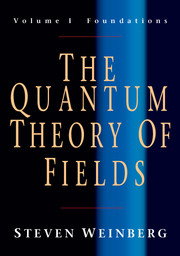Book contents
- Frontmatter
- Contents
- PREFACE
- NOTATION
- 1 HISTORICAL INTRODUCTION
- 2 RELATIVISTIC QUANTUM MECHANICS
- 3 SCATTERING THEORY
- 4 THE CLUSTER DECOMPOSITION PRINCIPLE
- 5 QUANTUM FIELDS AND ANTIPARTICLES
- 6 THE FEYNMAN RULES
- 7 THE CANONICAL FORMALISM
- 8 ELECTRODYNAMICS
- 9 PATH-INTEGRAL METHODS
- 10 NON-PERTURBATIVE METHODS
- 11 ONE-LOOP RADIATIVE CORRECTIONS IN QUANTUM ELECTRODYNAMICS
- 12 GENERAL RENORMALIZATION THEORY
- 13 INFRARED EFFECTS
- 14 BOUND STATES IN EXTERNAL FIELDS
- AUTHOR INDEX
- SUBJECT INDEX
9 - PATH-INTEGRAL METHODS
Published online by Cambridge University Press: 05 May 2013
- Frontmatter
- Contents
- PREFACE
- NOTATION
- 1 HISTORICAL INTRODUCTION
- 2 RELATIVISTIC QUANTUM MECHANICS
- 3 SCATTERING THEORY
- 4 THE CLUSTER DECOMPOSITION PRINCIPLE
- 5 QUANTUM FIELDS AND ANTIPARTICLES
- 6 THE FEYNMAN RULES
- 7 THE CANONICAL FORMALISM
- 8 ELECTRODYNAMICS
- 9 PATH-INTEGRAL METHODS
- 10 NON-PERTURBATIVE METHODS
- 11 ONE-LOOP RADIATIVE CORRECTIONS IN QUANTUM ELECTRODYNAMICS
- 12 GENERAL RENORMALIZATION THEORY
- 13 INFRARED EFFECTS
- 14 BOUND STATES IN EXTERNAL FIELDS
- AUTHOR INDEX
- SUBJECT INDEX
Summary
In Chapters 7 and 8 we applied the canonical quantization operator formalism to derive the Feynman rules for a variety of theories. In many cases, such as the scalar field with derivative coupling or the vector field with zero or non-zero mass, the procedure though straightforward was rather awkward. The interaction Hamiltonian turned out to contain a covariant term, equal to the negative of the interaction term in the Lagrangian, plus a non-covariant term, which served to cancel non-covariant terms in the propagator. In the case of electrodynamics this non-covariant term (the Coulomb energy) turned out to be not even spatially local, though it is local in time. Yet the final results are quite simple: the Feynman rules are just those we should obtain with covariant propagators, and using the negative of the interaction term in the Lagrangian to calculate vertex contributions. The awkwardness in obtaining these simple results, which was bad enough for the theories considered in Chapters 7 and 8, becomes unbearable for more complicated theories, like the non-Abelian gauge theories to be discussed in Volume II, and also general relativity. One would very much prefer a method of calculation that goes directly from the Lagrangian to the Feynman rules in their final, Lorentz-covariant form.
Fortunately, such a method does exist. It is provided by the path-integral approach to quantum mechanics. This was first presented in the context of non-relativistic quantum mechanics in Feynman's Princeton Ph. D. thesis, as a means of working directly with a Lagrangian rather than a Hamiltonian. In this respect, it was inspired by earlier work of Dirac.
- Type
- Chapter
- Information
- The Quantum Theory of Fields , pp. 376 - 424Publisher: Cambridge University PressPrint publication year: 1995



